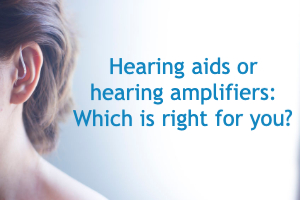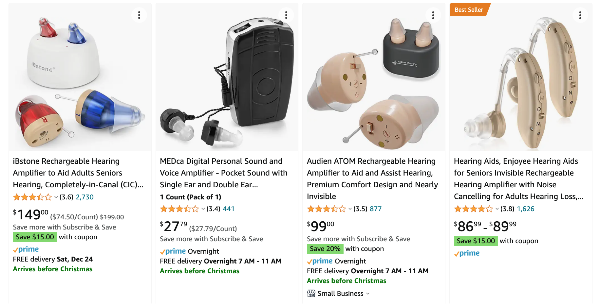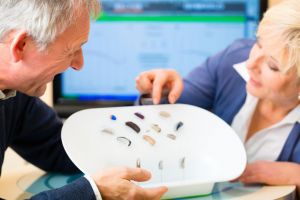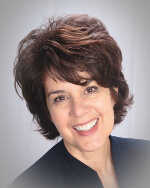|
www.HealthyHearing.com |
Buyer beware: Hearing amplifiers are not hearing aidsPSAPs are helpful for people with normal hearing in challenging listening situations
Contributed by Debbie Clason, staff writer, Healthy Hearing, and Joy Victory, managing editor, Healthy Hearing For people who are budget-conscious, it's tempting to overlook hearing aids and instead buy what's commonly known as a "hearing amplifier." 
However, these hearing devices are not intended for people with hearing loss. Personal sound amplification products (PSAPs) are sold online under many different names, including hearing aid amplifier, hearing amplifier aid, sound amplifier, digital sound amplifier and voice amplifier. The word "amplifier" is generally the clue that they are not hearing aids. Designs vary, but some models look nearly exactly like hearing aids. What's the difference?Both hearing aids and personal sound amplifiers amplify sound; however, there are major differences between the two products:
Then who should use a hearing amplifier (PSAP)?PSAPs are electronic devices designed for people with normal ability to hear, for when they want to amplify sounds for recreational purposes. They are not meant to be worn all the time. Examples include hunters who are listening for prey, birders or attendees at a lecture or performance when distance to the speaker or stage makes it hard to hear. (People with hearing loss who are birders can still wear hearing aids.) Prices range anywhere from $15 to $500. 
Dr. Melissa Danchak, AuD, of Kos/Danchak Audiology and Hearing Aids in Arlington, Texas, said these devices amplify sound in the way drugstore reading glasses enlarge print—but are even more "one size fits all." They sometimes include low- and high-mode amplification options, volume levels, noise reduction capabilities and multiple settings for various listening environments. Some models include a telecoil, which allows the user to connect to a room loop system. They are not meant to be used for hearing loss, but many people try them for that purpose regardless. They may help to an extent, but don't be surprised if you're not 100% pleased with your purchase. Hearing aids—fit by a professional audiologist or hearing instrument specialist—tend to have the highest consumer satisfaction rates, a study shows. A lot of this has to do with how hearing aids are programmable in a way that sound amplifiers aren't. “People have different degrees of hearing loss at different frequencies, or pitches, so the sound really needs to be shaped and fine-tuned for their loss,” Dr. Danchak explained. “Ears can also be very sensitive to loud sounds while not hearing soft sounds so simply making everything louder doesn’t work well for most people. Making everything louder just makes everything louder—all the things you do and do not want to hear.” Bottom line: Hearing amplifiers are affordable, and can help in very mild cases. But you're left on your own to figure out if you're amplifying sounds sufficiently and not damaging your hearing from unnecessary amplification of sounds that you can still hear. They also lack many of the advanced technological features found in hearing aids. 
shopping sites. These devices are not the same as hearing aids. Professionally fit premium hearing aids are highly customizableHearing aids are medical devices regulated by the Food and Drug Administration (FDA) and are sold by hearing healthcare professionals or available over-the-counter. Do hearing aids amplify all sounds?No. Unlike personal sound amplifiers, hearing aids are programmed for a person's individual hearing loss. Only the frequencies a person struggles to hear will be amplified, and those frequencies will be amplified at the correct volume for optimal hearing. Most people who wear them are older and have mild or moderate hearing loss, but special hearing aids are also available for kids and people with severe or profound hearing loss. Why does customization matter?Even if you just have a "little bit of hearing loss," your hearing loss is unique, which is measured during a hearing test. After your hearing test, you'll pick out hearing aids, and during the fitting process, the devices are calibrated to amplify specifically the sounds you no longer hear. For this reason, a pair of hearing aids can cost anywhere between $1,000 and $6,000. Sadly, they are typically not covered by private insurance even though hearing aids can improve your overall health. “Premium hearing aids are very sophisticated devices with sound processing strategies that have been researched and tested to give people with hearing loss the best quality of sound,” Dr. Danchak said. “They use extremely fast computer chips capable of doing millions of calculations per second and provide advanced digital signal processing that not only amplifies sound but analyzes the environment to determine what kind of setting you are in. This gives you the best and most automatic adjustments so that speech can be heard more clearly." They also ensure "loud sound doesn’t become too loud and noisy sounds don’t overwhelm the voice you might be trying to hear." Top-of-the-line hearing aids also use artificial intelligence. Hearing aid technology can be either basic or advanced, depending on the brand and model. But even "basic" hearing aids are far more customizable than they were in past years. Hearing care provider can help with either
find the best solution to your hearing loss. While you might be tempted to opt for a cheaper piece of equipment when your hearing begins to fail, experts caution against making that decision without the help of a qualified hearing healthcare professional. “There’s a difference between the cost of something and the value,” Dr. Danchak said. “What concerns me the most about PSAPs is that they may give people the false notion that hearing devices really don’t help when in fact, professionally fit and customized premium devices can help in a wide variety of settings.”
She said hearing aid costs are due to the years of research and equipment needed “to meet FDA requirements and to make a product that can withstand years of use in a waxy, moist environment” along with the service the hearing care professional provides over the life of the hearing aid, which is generally around five years. “PSAPs do not have to deal with any of this because they are not Class 1 medical devices,” she added. “They truly don’t address or help the consumer hear better or understand more clearly in all their daily environments.” Next stepsIf you aren’t hearing your best, it’s time to find out what's causing the hearing loss. You may have a simple problem, such as a build-up of wax in your ears or swelling from sinus or infection that is easy to treat. A hearing healthcare professional can evaluate your hearing and recommend the best course of treatment. Visit our directory of consumer-reviewed hearing clinics to find a provider near you. Debbie Clason, staff writer, Healthy Hearing
Joy Victory, managing editor, Healthy Hearing
|
Featured clinics near me
Earzlink Hearing Care - Reynoldsburg
7668 Slate Ridge Blvd
Reynoldsburg, OH 43068

Find a clinic
We have more hearing clinic reviews than any other site!


 Debbie Clason holds a master's degree from Indiana University. Her impressive client list includes financial institutions, real estate developers, physicians, pharmacists and nonprofit organizations.
Debbie Clason holds a master's degree from Indiana University. Her impressive client list includes financial institutions, real estate developers, physicians, pharmacists and nonprofit organizations.
 Joy Victory has extensive experience editing consumer health information. Her training in particular has focused on how to best communicate evidence-based medical guidelines and clinical trial results to the public. She strives to make health content accurate, accessible and engaging to the public.
Joy Victory has extensive experience editing consumer health information. Her training in particular has focused on how to best communicate evidence-based medical guidelines and clinical trial results to the public. She strives to make health content accurate, accessible and engaging to the public.